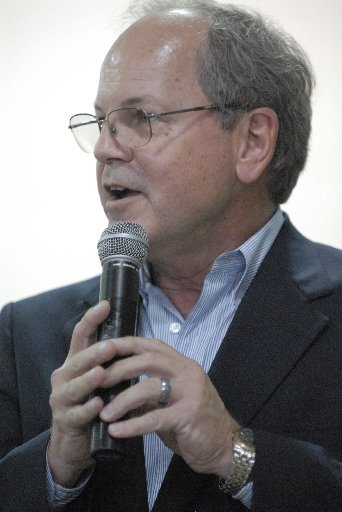A Chattanooga-based medical research firm that would compile data from Ivy League scientists investigating diseases -- including Alzheimer's and Parkinson's -- will allow the city to capitalize on its high-tech framework, supporters say.
But the Chattanooga Research Institute doesn't have a dime to its name, something Hamilton County Commissioner Tim Boyd wants to change with a by-invitation-only conference to launch fundraising. Former congressman Zach Wamp, a leading advocate for high-tech jobs, will be the keynote speaker.
Boyd said several scientists -- some from Harvard University, including his son, Justin, and others from the University of California-San Diego -- are expected to attend the conference Feb. 7. They will tell potential donors about their research in computational biology, a field that streamlines data from computer science, molecular modeling and chemistry to solve medical problems.
"They study the way our cells and pharmaceutical drugs interact with each other," Boyd said. "The faster the computer gets them results, the quicker we can discover new drugs to help people -- that's what it's all about."
Boyd and his business associate, Stephen E. Meyer, a consultant with Volkert Inc., said the institute would need $6.25 million to bankroll its first three years of operation. Meyer said that number would fund "computer time, leases for our office space and researchers with Ph.D's -- they aren't cheap."
"We want to obtain local, private funding," Meyer said. "There may also be opportunities for public money. That includes the National Institute of Health grants. We're leaving no stone unturned."
But, Meyer added, the nonprofit Chattanooga Research Institute's product -- "our knowledge" -- eventually will become self-sustaining.
"I think Big Pharma is going to be a client of ours," Meyer said, referring to the multibillion-dollar pharmaceutical industry. "This phase is the very beginning."
The announcement comes about four months after Chattanooga's EPB installed ultra-high-speed Internet service of up to 1 gigabit a second -- 200 times faster than the average broadband speed in America. If funded, the institute will use EPB's service, Boyd said.
EPB President Harold DePriest called the research institute a "great opportunity."
"Chattanooga's slowly beginning to emerge in people's minds as a really viable technology hub for this region," he said.
Much of the institute's operations would involve data storage and transfer. Terenine, a technology company on Amnicola Highway, has entered a good-faith agreement to keep legions of data secure for scientists, according to marketing director Connie Roberts.
Boyd said the vision for the institute came from his son Justin, a 1995 Baylor School graduate and research scientist at Harvard Medical School.
But the younger Boyd downplayed his father's involvement.
"To address potential nepotism or whatever, taking advantage of the system ... let me say exactly what happened. ... Dad did set up certain conversations, but he did not have anything to do with what was discussed or the direction of the conversations," Justin Boyd said.
Meyer said a major incentive for number-crunching scientists to reroute their research is the Jaguar, a supercomputer housed in Oak Ridge National Laboratory in Oak Ridge, Tenn. He said the group will use "Chattanooga infrastructure" to send data to the Northeast.
"Having the Jaguar shortens the time to having high-impact drugs available for patients," Meyer said. "Eventually, we'll have a patient database -- without the names -- to determine how effective different drugs are for the average individual."
Contact staff writer Chris Carroll at ccarroll@timesfreepress.com or 423-757-6610.

